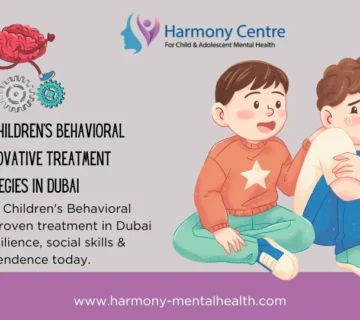Feeding Assessments Dubai: Comprehensive Nutrition Evaluations at Harmony Centre
Discover comprehensive feeding assessments in Dubai at Harmony Centre. Our expert evaluations guide child nutrition and address feeding challenges for optimal growth.
Contact Information
| Contact Method | Details |
|---|---|
| Phone | +971 (52) 8773268 / 04 558 2015 |
| Click Here | |
| info@harmony-mentalhealth.com | |
| Address | Office 409, Building Alrazi-64C, 26th St, Healthcare City, Dubai |
Introduction
In Dubai’s fast‑paced, diverse environment, ensuring that children receive proper nutrition is vital for their growth and development. At Harmony Centre Mental Health Dubai, we understand that feeding challenges can impact not only physical health but also emotional and cognitive well‑being. Our comprehensive feeding assessments are designed to evaluate your child’s nutritional status, identify feeding issues early, and provide targeted interventions that promote healthy eating habits.
By using evidence‑based practices and a multidisciplinary approach, our expert team offers personalized evaluations that inform effective feeding solutions. This article explains the importance of feeding assessments, outlines our thorough evaluation process, and offers practical strategies for parents and educators to support child nutrition.
Learn More About Harmony Centre • Contact Us
Understanding Feeding Assessments
What Are Feeding Assessments?
Feeding assessments are comprehensive evaluations that examine a child’s eating habits, nutritional intake, and mealtime behaviors. These assessments aim to identify any difficulties that might hinder healthy nutrition, such as food selectivity, texture sensitivities, or underlying developmental challenges.
Core Elements of Feeding Assessments
- Nutritional Evaluation:
Assessing dietary intake, meal patterns, and nutritional balance. - Behavioral Observation:
Observing mealtime behaviors to identify challenges like food refusal or tantrums. - Physical Examination:
Evaluating growth parameters and physical signs that may indicate nutritional deficiencies. - Developmental Screening:
Identifying developmental delays or sensory issues that could impact feeding.
Why Feeding Assessments Are Essential
Feeding assessments provide critical insights that help tailor interventions for each child. Early detection of feeding issues can prevent nutritional deficiencies, improve developmental outcomes, and reduce mealtime stress for families.
- Early Intervention:
Prompt assessments enable early detection and timely support. - Personalized Care:
Tailored evaluations lead to customized feeding strategies that address specific challenges. - Holistic Health:
By examining both physical and behavioral aspects, feeding assessments contribute to overall well‑being. - Parental Empowerment:
Informed parents can make better decisions regarding nutrition and collaborate more effectively with healthcare providers.
Our Feeding Assessment Process at Harmony Centre
Initial Consultation
Gathering Background Information
At Harmony Centre, the feeding assessment process begins with a detailed initial consultation. During this session, our specialists collect essential background information from parents and caregivers to understand the child’s current eating habits and any concerns they have.
- Family History:
We discuss any previous feeding issues, allergies, or dietary restrictions. - Medical Records:
Relevant medical history, growth charts, and developmental milestones are reviewed. - Parental Observations:
Parents share their observations regarding mealtime behaviors, food preferences, and any challenges they encounter.
This initial step sets the foundation for a comprehensive evaluation.
Comprehensive Evaluation
Standardized Nutritional Assessment
We use scientifically‑validated tools to assess the child’s nutritional intake and dietary patterns.
- Food Diaries:
Parents are asked to maintain a food diary for a specified period, documenting all meals, snacks, and beverages. - Nutritional Questionnaires:
These questionnaires help quantify the child’s nutrient intake and identify potential deficiencies. - Growth Measurements:
Regular tracking of height, weight, and BMI provides objective data on the child’s physical development.
Behavioral and Mealtime Observations
Our clinicians conduct direct observations to understand the child’s mealtime behaviors in both structured settings and natural environments.
- Structured Observations:
During a scheduled session, therapists observe the child’s interactions with different foods and note any signs of distress or reluctance. - Natural Environment Observations:
When possible, observations are made in the child’s home or school setting to capture everyday behaviors. - Video Analysis:
In some cases, parents may be asked to record mealtime sessions to provide additional insights into feeding patterns and challenges.
Collaborative Feedback
Input from parents, educators, and caregivers is critical to a holistic feeding assessment.
- Parental Interviews:
Detailed interviews capture the nuances of the child’s eating habits and parental concerns. - Teacher and Caregiver Feedback:
Educators provide insights on how feeding issues may be affecting the child’s behavior and performance at school.
Learn More About Our Assessment Process
Multidisciplinary Team Review
Integrated Data Analysis
Once all data is collected, our multidisciplinary team meets to analyze the results and develop a comprehensive diagnostic profile.
- Team Collaboration:
Psychologists, nutritionists, occupational therapists, and speech therapists work together to interpret the data. - Diagnostic Profile Creation:
The team formulates a detailed profile that outlines the child’s strengths, challenges, and specific areas for intervention. - Goal Setting:
Clear, measurable objectives are established to guide the subsequent treatment plan.
Culturally Sensitive Considerations
Our assessments are tailored to Dubai’s diverse cultural landscape, ensuring that the evaluations respect local traditions and language preferences.
- Language Support:
Multilingual resources and consultations are available to ensure clear communication. - Cultural Relevance:
Assessment tools and dietary recommendations are adapted to align with cultural food preferences and practices.
Developing a Personalized Feeding Intervention Plan
Tailored Treatment Strategies
Based on the comprehensive assessment, our team at Harmony Centre develops a personalized treatment plan designed to address the child’s specific feeding challenges.
Individualized Feeding Plans
- Customized Nutritional Guidelines:
Our nutritionists create meal plans that balance nutritional needs with the child’s food preferences. - Behavioral Interventions:
Techniques such as gradual food introduction, positive reinforcement, and sensory integration activities are employed to address food refusal and other mealtime behaviors. - Therapeutic Support:
If needed, additional therapies like occupational therapy or speech therapy are integrated to support feeding skills.
Family-Centered Care
- Parental Workshops:
We offer training sessions to help parents implement feeding strategies at home and create a supportive mealtime environment. - Home Practice Strategies:
Tailored exercises and activities are provided for parents to practice with their child, reinforcing the strategies learned during therapy. - Ongoing Monitoring:
Regular follow‑up sessions track progress and allow for adjustments to the intervention plan as needed.
Collaborative Goal Setting
- Short‑Term Goals:
Immediate objectives might include reducing food refusal or increasing the variety of foods accepted. - Long‑Term Aspirations:
Goals may involve establishing balanced eating habits that promote overall growth and well‑being. - Measurable Outcomes:
Each goal is clearly defined and measurable, ensuring that progress can be tracked over time.
Learn More About Our Feeding Solutions
Contact Harmony Centre
Evidence‑Based Outcomes and Success Stories
Quantitative Improvements
Our evidence‑based approach has yielded significant, measurable improvements in children who undergo feeding assessments and interventions:
- Improved Nutritional Intake:
Children show increased consumption of a variety of foods, leading to better overall nutrition. - Enhanced Growth Metrics:
Regular monitoring of growth parameters indicates improvements in height, weight, and BMI. - Behavioral Improvements:
Positive changes in mealtime behaviors result in fewer conflicts and a more pleasant dining experience.
Qualitative Success
Parents and educators have reported transformative changes following our feeding interventions:
“After a comprehensive feeding assessment at Harmony Centre, we learned how to gradually introduce new foods to our son. His willingness to try different foods has improved dramatically, and our mealtimes are much more relaxed.”
– Parent Testimonial
“The personalized feeding plan made a significant difference in my daughter’s nutrition and overall mood. It’s heartening to see her more energetic and focused at school.”
– Parent Testimonial
For additional reading on child nutrition and feeding strategies, refer to the Academy of Nutrition and Dietetics (external link).
Practical Strategies for Families and Educators
For Families
Create a Conducive Mealtime Environment
- Establish Consistent Meal Times:
Use visual schedules to create regular mealtime routines that provide structure and reduce stress. - Designate a Calm Eating Area:
Set up a quiet, inviting space free from distractions where your child can focus on eating. - Engage in Family Meals:
Sharing meals as a family reinforces positive eating habits and fosters healthy communication.
Introduce Foods Gradually
- Small Portions:
Introduce new foods in small amounts alongside familiar favorites to reduce resistance. - Creative Presentation:
Make meals visually appealing by incorporating colorful fruits and vegetables. - Involve Your Child:
Include your child in meal planning and preparation, increasing their interest and willingness to try new foods.
Utilize Digital Tools
- Telehealth Consultations:
Use our telehealth services for nutrition consultations, ensuring continuous support and guidance. - Educational Apps:
Leverage apps that provide nutritional information, meal planning tips, and interactive food-related games.
For Educators
Integrate Nutrition Education into the Curriculum
- Interactive Lessons:
Teach students about balanced diets and the importance of various nutrients through engaging, hands‑on activities. - Group Projects:
Organize classroom activities that involve meal planning or cooking demonstrations. - Collaborate with Nutrition Experts:
Invite specialists from Harmony Centre to conduct workshops and seminars, reinforcing the importance of healthy eating.
Foster a Supportive School Environment
- Encourage Healthy Eating:
Work with school cafeterias to offer a variety of nutritious food options. - Monitor Student Behavior:
Observe students’ eating habits and provide feedback to parents and therapists to ensure consistency. - Promote Peer Interaction:
Facilitate group discussions about healthy eating to foster social support and shared learning.
For the Community
Engage in Community Nutrition Workshops
- Attend Local Seminars:
Participate in community events focused on child nutrition and healthy eating habits. - Join Parent Support Groups:
Share experiences and practical strategies with other parents to build a supportive network. - Advocate for Access to Nutritious Foods:
Work with local organizations and schools to promote policies that ensure all children have access to balanced meals.
Utilize Online Resources
- Access Digital Guides:
Explore our online resource hub for articles, videos, and practical tips on child nutrition. - Participate in Webinars:
Engage in virtual seminars hosted by nutrition experts to stay informed about the latest research and best practices.
Explore Our Community Initiatives
Contact Harmony Centre
Frequently Asked Questions about Feeding Assessments Dubai
Book a Consultation Now
Contact Information
Office Address:
Office 409, Building Alrazi-64C, 26th St, Umm Hurair 2, Dubai Healthcare City, Dubai
Phone:
+971 4 558 2015
+971 5 287 73268
Email:
info@harmony-mentalhealth.com
Final Thoughts about Feeding Assessments Dubai
Feeding assessments are a vital step in addressing and preventing nutritional challenges in children. At Harmony Centre Mental Health Dubai, our comprehensive, evidence‑based evaluations provide the foundation for personalized feeding interventions that promote healthy growth and development. By integrating nutritional, behavioral, and developmental assessments, we empower families to implement effective strategies that ensure their child receives the nourishment needed to thrive.
Invest in your child’s future with expert feeding assessments that pave the way for long‑term well‑being. Trust Harmony Centre to guide you through every step of the process with compassion, expertise, and a commitment to excellence.
Learn More About Harmony Centre
Get in Touch
👉 Book a Consultation Now: Call +971 4 558 2015 or visit www.harmony-mentalhealth.com.
Join our online community and stay updated with our latest events, articles about Feeding Assessments Dubai



